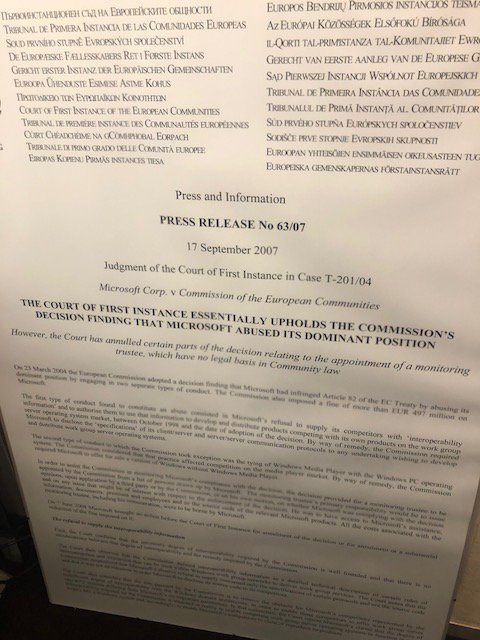Morning campers! I’ll be live-tweeting from the European Court of Justice today about @Google’s “Right to be Forgotten” hearing.
What’s the main point? Should Europe (or France’s #privacy regulator) be able to apply its rules over the internet worldwide.
A recap:
What’s the main point? Should Europe (or France’s #privacy regulator) be able to apply its rules over the internet worldwide.
A recap:
La Vanguardia, a Spanish newspaper, published records in the late 1990s detailing the debt delinquencies of Mario Costeja.
About a decade later, Costeja sued, saying that the publication breached his right to privacy.
About a decade later, Costeja sued, saying that the publication breached his right to privacy.
After a lengthy legal dispute, the case was referred to the ECJ which, in 2014, ruled that individuals had the right to ask that search engines like @Google remove links (but not the underlying webpages) from search results
This was a big deal. And surprised almost everyone (I was at a privacy conference w/ a bunch of EU regulators at the time, and there were vocal gasps when the ruling came in)
Why was it a big deal? For the first time, individuals were given the right to ask Google, et al to remove stuff from how most people find things on the web. For privacy activists, it was welcomed news. For freedom of speech activists, it was a dark day
At first, Google tried to contain the “Right to be Forgotten” ruling to just Europe, removing links only from EU domains like Google.de.
But France’s privacy watchdog balked, saying that people’s rights would still be infringed as the information could still be accessed. And after legal fight, @Google gave in, removing the links from all of its domains accessible in Europe
@Google That satisfied a bunch of European privacy officials. But for the French, that didn’t go far enough. Their view is that “Right to be Forgotten” should apply globally, meaning Google must remove the links from all of its sites worldwide
Why? B/c, according to French, an individual’s right to privacy doesn’t relate to how others access information on him/her, but on whether his/her rights are protected worldwide.
“Your personal rights don’t change when third parties access the information,” Gwendal Le Grand, a French official, told me last week. “My right to be visible in search engines doesn’t depend on how you use a search engine"
Obviously, Google disagrees. For them (and freedom of speech activists), Europe shouldn’t have the right to extend its privacy rules around the world. And warn that others (<<cough>> Russia & China <<cough>>) would then follow suit
They argue that there needs to be a balance between an individual’s right to privacy and others’ right to access information, say on someone’s past criminal convictions, etc
And, to be fair, the Right to be Forgotten isn’t absolute. You have to show that the information you want to remove from Google is no longer relevant. And famous people (even journalists!) can’t get info scrubbed
Couple of data points: So far, Google has agreed to remove roughly 44% of the 723,000 requests (involving 2.7 million links), according to its latest transparency report. More here: bit.ly/2O8P5C0
And, weirdly, the Right to be Forgotten has made Google arguably Europe’s most activist #privacy regulator, as people must go to them first if they want info removed (they, then, can appeal to national regulators — but most of the time, they agree w/ Google)
Shameless plug: I wrote about that weirdness here nyti.ms/2qnGwtZ
So what are we arguing about today?
2 points — Should ‘Right to be Forgotten’ be applied globally, and if so, should Google take down the links anywhere in the world?
And: should so-called ‘sensitive data’ (like political opinions) be automatically removed if ppl ask for that
2 points — Should ‘Right to be Forgotten’ be applied globally, and if so, should Google take down the links anywhere in the world?
And: should so-called ‘sensitive data’ (like political opinions) be automatically removed if ppl ask for that
For me, the first (global application of Right to be Forgotten) is the most important. But if the judges rules that sensitive data should be automatically removed (the French regulator doesn’t want this), then that could have some serious implications
And with that, you’re all caught up. I’ll be here all day, tweeting & writing stories. If you have any questions/thoughts, drop me a line.
Fun fact: the ECJ livestreams the proceedings to the on-site press room, but don’t live-stream it anywhere else? Why? Who the hell knows!
Fun fact: the ECJ livestreams the proceedings to the on-site press room, but don’t live-stream it anywhere else? Why? Who the hell knows!
And b/c the ECJ isn't above some top-notch trolling. In the press room, there's a poster of @EU_Commission's #antitrust ruling against @Microsoft.
<<wonders out loud>> So that's why Europe hates US tech! :P
<<wonders out loud>> So that's why Europe hates US tech! :P

For all you #privacy wonks, here are the legal questions that are on deck today: bit.ly/2O8oK7h
Lawyer for 4 French ppl who want their sensitive data automatically removed from Google hits out: "Search engines aren't journalists, so they don't fall into this category (of freedom of the press)"
Google lawyer refers to search engine as a 'library.' So does that make its algorithm a digital Dewey Decimal system? #askyourparents
Google lawyer says only 0.3% of 700k RTBF requests are ever appealed, and usually, Google & national privacy agencies almost always agree. "Why then call into question the very existence of search engines to offer a protection which is almost already entirely satisfying?"
*satisfied
This case may sound super geeky, but it has real world implications. One of the people looking to get data automatically removed from Google was convicted for sexual assualts on minors when he was a school supervisor
Google says its current RTBF system is 99.94% accurate in removing links seen by people in Europe. That's a pretty high figure, though French privacy regulator says that's not good enough
Lawyer for French regulator now talking: says Google's efforts to comply RTBF don't go far enough, doesn't allow EU citizens to benefit from right to privacy and that global remit of standard is only way to ensure European rights are upheld
"The proposed solution from the CNIL (French privacy regulator) may a bold one. But it's based on bold decision by EU officials"
Main point: RTBF should protect individuals' rights to privacy, anywhere in the world. Just because others may have limited access to information on the web isn't the point. It's about protecting the individual's right to privacy
We're now onto third-party groups, including Wikimedia, Microsoft, Reporters Committee for Freedom of the Press, as well as Ireland, Italy, Austria & European Commission.
There are some tough decisions to be made here: will Europe's RTBF have a chilling effect in not-so democratic countries where freedom of speech/expression are less enshrined than in Europe/US?
"The whole world is listening to you. The whole world is waiting to hear what you say," says lawyer for Internet Freedom Foundation
"Decision of the French regulator opens the door for foreign countries to imposse universal restrictioikns on freedom of expression," IFF lawyer adds. "Delisting would gain momentum, and disinformation would hold sway.?
And if you're a @POLITICOEurope Pro subscriber, here's my first take on the hearing: politico.eu/pro/google-cla…
Next up: @Microsoft -- yes, they too have a search engine. <<waits for laugh>> Ok, ok. Everyone gets a chance to speak...
"A world in which one country, or one individual, could impost their views on access to information is not acceptable," says MSFT lawyer
Come on MSFT. Even when it comes to Right to be Forgotten, you're getting out-hustled by Google. MSFT lawyer says they're 97% accurate in determing people's geographical location vs. 99.94% for Google.
Most important update so far: this is what passes for “coffee” at ECJ. Am seriously regretting not bringing my own coffee gear... #FirstWorldProblems 

Reporters Committee for Freedom of the Press now giving testimony: search engines help reporters to find info, RTBF impacts other freedoms, inc. freedom of expression. Says 30% of complaints to French #privacy regulator relate to media publishers
Global application of RTBF may limit freedom of expressions/impart of knowledge in countries outside of the EU; if Europe leads the way, what would stop non-democratic regimes (cough, Russia/China, cough) from doing the same?
Speaker after speaker, people are saying RTBF applied globally will hamper freedom of expression worldwide, and that there's a balance between right to privacy & freedom of expression
But, for me, that's missing the underlying point. France's #privacy regulator's arguments focus on the individual, saying that people should have the right to privacy no matter where information is accessed (in either EU or elsehwhere)
But for Google, focus is more on the wider society, as in -- we should have the right to access info, no matter where we are. Both arguments are legitimate, but they come from very different places.
For French, the individual comes first. For Google, wider society has a say
For French, the individual comes first. For Google, wider society has a say
Nice to see people are following along, including other journalists (ahem, @TechCrunch) techcrunch.com/2018/09/11/goo…
The joys of the EU: we're onto member states' submissions. France backs global application, Ireland says it should be limited to EU.
For anyone confused about how Europe can ever speak w/ one voice, that makes two of us...
For anyone confused about how Europe can ever speak w/ one voice, that makes two of us...
Irish govt lawyer: "Google & other search engines play a role in democratic society in conveying information to the public." Suggests that Google, et al may be 'journalists.'
<<shakes head>> But how can they then defend themselves as 'neutral platforms?
<<shakes head>> But how can they then defend themselves as 'neutral platforms?
Fun Fact: Under Europe's new #privacy standards, known as #GDPR, 'right to be forgotten,' (or, technically, 'right to erasure) is baked into EU law & applies to everyone, not just search engines.
It's part of Europe's data imperialism politico.eu/article/europe… HT: @laurenscerulus
It's part of Europe's data imperialism politico.eu/article/europe… HT: @laurenscerulus
Another one for @POLITICOEurope Pros -- on how EU member states are clashing over "right to be forgotten" politico.eu/pro/france-ire…
Recess until 14:30 CEST. Off to find a good cup of coffee. This might be a doomed challenge.
About to go on @KCBSRadio to talk about Google case. For those on West Coast, chance to hear why I have a face for radio...
.@EU_Commission lawyer: makes case for why Google & others should comply w/ Right to be Forgotten, but fudges on question on whether right should apply just within EU or globally. Bravo, bravo.
Judges asking a bunch of technical questions about how the current RTBF applies, and what are its limits.
But for me, it comes down to this: who has the right to police the web? And how do you avoid balkanizing the digital world as govts battle out for supremacy.
But for me, it comes down to this: who has the right to police the web? And how do you avoid balkanizing the digital world as govts battle out for supremacy.
I've said it before, but we're moving gradually to a so-called 'splinternet' in which people's digital experiences vary wildly between countries. Here's something I wrote about a group trying to solve that maddeningly difficult question politico.eu/article/intern…
Date for the Diary: ECJ advocate general will give his opinion on the case on Dec. 11. Nice early present from Christmas...
And we're done. Lots to digest here. And thanks for following along.
Couple of takeouts: @Google is banking that it's already done enough when removing links from Europe that it won't have to do more (that's naive, imho).
Couple of takeouts: @Google is banking that it's already done enough when removing links from Europe that it won't have to do more (that's naive, imho).
.@CNIL is banking on indidividuals' right to privacy taking precedent over wider society's right to access to information. That's a tough one, too, mostly because it places privacy rights 100% above freedom of expression
*for Festivus
Final tweet of the day: In @Google Privacy Case, Europe’s Highest Court to Rule on the Future of the Internet politico.eu/article/google…
• • •
Missing some Tweet in this thread? You can try to
force a refresh





